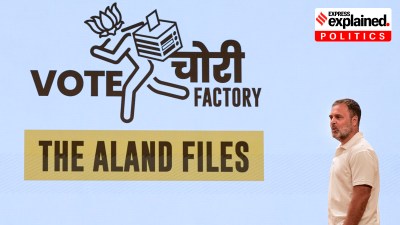Maharashtra’s three-language policy expected to be ready by December 5, public opinion in focus
Announcing the committee’s plan of action at a press conference in Mantralaya on Wednesday, Dr Narendra Jadhav, who heads the eight-member committee, said the process will involve both digital outreach and on-ground interactions across Maharashtra.
 Following multiple revisions, Chief Minister Devendra Fadnavis put the policy on hold on June 29 and announced the formation of a new committee under the leadership of Dr Jadhav, a former member of the Planning Commission.
Following multiple revisions, Chief Minister Devendra Fadnavis put the policy on hold on June 29 and announced the formation of a new committee under the leadership of Dr Jadhav, a former member of the Planning Commission.The final framework of Maharashtra’s three-language policy for school students will be shaped by a wide-ranging consultation process, as the state government-appointed committee begins its work to collect opinions from all stakeholders including teachers, parents, academic institutions, language activists, and political leaders.
Announcing the committee’s plan of action at a press conference in Mantralaya on Wednesday, Dr Narendra Jadhav, who heads the eight-member committee, said the process will involve both digital outreach and on-ground interactions across Maharashtra.
“While there will be a dedicated website to invite response from everybody via a list of multiple-choice questions, the committee is also going to move across Maharashtra to hold discussions and accept people’s opinions,” said Dr Jadhav.
The committee held its first meeting earlier in the day, where all members were present, and finalised the broad outline of their work. According to Dr Jadhav, a special cell will be created to ensure proper documentation of public inputs in real-time. “The committee is expected to submit its report by December 5, which is three months from the formation of the committee on September 5,” he said.
The policy revision process was triggered after widespread criticism of the state’s move to mandate Hindi as the third language in Marathi and English medium schools under the Maharashtra State Board. Following multiple revisions, Chief Minister Devendra Fadnavis put the policy on hold on June 29 and announced the formation of a new committee under the leadership of Dr Jadhav, a former member of the Planning Commission. However, the remaining members of the panel were formally appointed only on September 5 through a government resolution.
The committee has decided to incorporate both expert insights and grassroots-level feedback to arrive at its final recommendations. “I am personally going to meet all political leaders such as Uddhav Thackeray, Raj Thackeray who have voiced their opinions in this matter in the past. These interactions will be aimed at understanding their point of views,” said Dr Jadhav.
A major part of the consultation will be conducted through an online questionnaire designed to be accessible to the general public. “It is decided that a questionnaire will be prepared which will be circulated via a link to invite response from all people. The questionnaire will include multiple choice questions such as–When third language should be introduced? With answers such as – from Class 1, Class 3, Class 5, Class 9 or never,” he said.
In addition to online engagement, the committee will host public meetings in eight locations across the state–Kolhapur, Nashik, Nagpur, Ratnagiri, Solapur, Pune, and Mumbai in October and November. “These will be day-long meetings at a location decided by local administration where individuals, association and activists from the district and surrounding places can meet the committee members to present their point of view on the topic,” said Dr Jadhav.
The outcomes of these extensive public consultations will form the foundation of the committee’s recommendations to the government, expected by early December.







